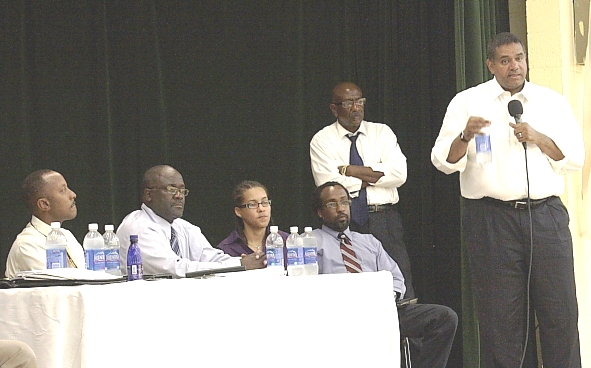
DeJongh opened the meeting by acknowledging the anxiety felt by many of the territory’s citizens due to the closure of the Hovensa refinery and the ongoing financial crisis. He said he welcomed the chance to hear from citizens directly and that he hoped he could provide adequate answers to the approximately 100 people in attendance.
“I work for you, so don’t hold back on the questions,” he told the crowd.
The governor was asked early on whether his administration was still devoted to the construction of a sports complex on St. Croix. The proposed project to build such a complex in Frederiksted with developer GlobeVest V.I. was tabled indefinitely Monday.
DeJongh replied that he was still in favor of such a project, arguing that sports tourism would be a boon for the island because it is a niche market that is not being exploited by other Caribbean islands.
Stressing the need to be both aggressive and prudent, he said he would continue to look for an appropriate development deal in which the territory’s money would not be put at risk.
DeJongh also fielded a question on extending peace officer status to federal agents. He told the crowd that offering that status was the norm throughout the country with only a handful of jurisdictions opting not to. DeJongh added that those other jurisdictions tended to have low crime rates and did not face the same challenges the Virgin Islands do.
Police Commissioner Henry White Jr. echoed the governor’s sentiments, saying that opposition to the move arose from a misperception that it amounted to a federal takeover of the Police Department.
“You’re not going to have FBI agents chasing people down and giving tickets,” he said. “That’s not going to happen.”
White reassured the crowd that the move would not result in the island being flooded by federal agents, adding that most federal law enforcement agencies already had personnel on the islands.
Peace officer status would allow those agents to enforce certain parts of the V.I. Code and make it easier for those agencies to work in tandem with police, White said. He concluded by saying the move in no way threatened the autonomy of the VIPD.
“I wouldn’t let that happen and neither would the governor,” he said.
Public Works Commissioner Darryl A. Smalls took the opportunity to update the public on a number of projects on St. Croix.
He said the end was in sight for the Christiansted bypass, a project that had been on the drawing board for 25 years.
“I’m happy to report that this project will come to a culmination November of this year,” he said.
He also announced that his department had secured funds from FEMA, the Department of the Interior, and the American Recovery and Reinvestment Act to completely rebuild the Christiansted boardwalk, from the seaplane terminal to the fort.
He said the existing wooden planks would be replaced with ones made from a composite material that could better handle exposure to moisture and the weather. Fifty solar powered lights will also be installed along the boardwalk.
Smalls declined to give a firm date on when this project would be completed.
The mood of the meeting darkened considerably when the topic turned to the Water and Power Authority. A long line of citizens waited for their chance to take the microphone to complain about their monthly payments.
While each citizen had their own examples, the overall message of each was the same: the LEAC charge was making it difficult to live and do business in the territory and the government must do something to bring it down.
Karl Knight, director of the V.I. Energy Office, said there was no easy fix for the territory’s energy problems. He said that the fundamental issue is that the territory is reliant on fuel oil that must be shipped in to provide the base load for its electrical grid.
He argued that it was not fair to compare the territory’s rates to those enjoyed in the states where there is easy access to cheaper fuel sources, such as natural gas and coal. He said that in other small island communities, people were paying rates similar to those charged by WAPA because they too were reliant on fuel oil.
“That’s why we’re moving as quickly as we can to diversify,” Knight said.
He pointed to WAPA’s recent purchase of 18 megawatts of solar energy as a sign that things were headed in the right direction. He said the government is also considering wind and natural gas projects.
DeJongh became passionate on this topic, strongly rejecting one questioner’s assertion that the high electricity bills were all due to politics. He told the crowd that they had the right to be upset about the cost of electricity, but cautioned that it would take time to address the problem.





